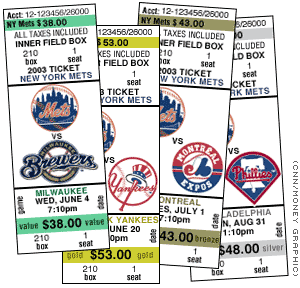
NEW YORK (CNN/Money) -
The New York Mets will pay Mike Piazza about $89,500 for every regular-season game they play this season.
But fans of the team wanting to see the star catcher will pay four different prices to sit in the same seat at Shea Stadium, depending on the opponent, the day of the week, and even the month of game.
Sports teams are finally discovering what fans and scalpers have known for years -- not all games are created equal. More teams are charging extra for the games at which they anticipate the greater demand, and giving discounts for less attractive games at which seats are likely to go empty.
 |
|
| The same seat at Shea Stadium this season will cost four different amounts as the New York Mets follow a trend toward variable pricing. (Tickets are illustration, not actual reproduction.) |
"The idea is to maximize dollars and maximize the number of tickets sold," said Stan Kasten, president of the Atlanta Braves, which also instituted a variable pricing plan for this coming season. "You maximize dollars for highly desirable games, and offer value to attract people to games they might otherwise not attend. Variable pricing is an idea that comes from the real world -- airlines, department stores. It's not an idea that sports invented. Sports has come to quite late to the party."
Thank God that baseball hasn't yet decided to follow airlines in requiring Saturday night stayovers for the cheaper seats, although some games certainly seem like they're heading that way.
Kasten is also president of the National Basketball Association Hawks and National Hockey League Thrashers which, like the Braves and CNN/Money, are owned by AOL Time Warner. He said no decision has been made on whether the Hawks and Thrashers will institute variable pricing, but he wouldn't rule it out for as soon as next season.
"Whenever we arrive at the best strategy, I think it'll spread to most teams," he said. "All of us are experimenting. We're basing it on days of the week. Others are basing it on opponents."
The Mets' plan is most complex. It kept prices at 2002 levels for 27 of its games this coming season, or a third of its schedule, and cut ticket prices between 7 and 33 percent for another 16, low-demand games. The team raised prices between 7 and 16 percent for 21 more attractive games, and for its 17 hottest games, against the crosstown-rival Yankees, defending National League champs San Francisco Giants, and other marque teams, the team is charging 17-to-33 percent above 2002 prices. Day of the week, time of the season, and special promotions also factor into the pricing scheme.
The Colorado Rockies, St. Louis Cardinals and the Giants also have variable pricing. Giants Chief Operating Officer Larry Baer estimates that charging more for weekend games from non-season ticket holders generated $1 million in additional revenue during this past season. Even the Yankees are dipping their toe in the variable pricing waters, cutting the price of their upper deck seats for some of their weaker opponents' midweek visits this coming season.
| Related columns
|

|
|
|
|
Some teams, like the Giants, exempt season-ticket holders from the premium pricing, but others, including the Mets, charge the season ticket holders the same basic prices as single-game buyers.
The idea has already spread to hockey, with the Ottawa Senators and Pittsburgh Penguins charging more for hotter games. The Senators have been deprived sellouts at the hot games where prices are up 10-to-20 percent this season. But the increased revenue per ticket more than makes up for the empty seats.
Player salaries don't drive prices
The variable pricing plans should be the most stark lesson yet for fans that they are wrong about the popular belief that player salaries determine ticket prices. As the first day of Econ 101 should teach you, prices in a free market are determined primarily by supply and demand, not cost of product.
It's a perception that owners have done their best to enforce, and Kasten continued to argue the owners' line, even while extolling variable pricing strategy.
"I think its naive to assume that ticket prices are independent of expenses," he said. "Yeah, there's supply and demand, but if expenses weren't so high, we could charge less. It's a chicken-and-the-egg type of question."
| SportsBiz
|

|
|
|
|
There has been some criticism of the variable pricing plans by fans and sportswriters. One New York columnist suggested the Mets should refund the premium they're charging fans to see the Giants and slugger Barry Bonds if the team then goes ahead and intentionally walks Bonds repeatedly during the game. But as long as there are fans willing to pay the extra money for the prime games, the criticism will be as hollow as the owners' complaints about the economics of the game.
Sports tickets are a limited, and perishable, product. The new pricing plans recognize that when far more fans want to attend a game than there are seats available, prices can rise. They also recognize that cutting prices on less attractive products is the only way to get revenue before their shelf life expires. No matter how cheap the Mets price tomorrow's game against the lowly Pittsburgh Pirates, it's better than being stuck with unsold tickets.
Of course, scalpers know all this. They can make a good living by understanding what the demand will be for prized tickets. Fans can gripe about teams now charging more for the hot tickets, but they've been paying that kind of premium for decades to guys hanging out in front of the stadium on game day.

|

